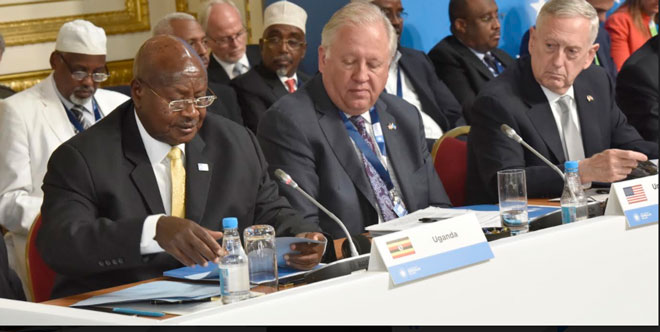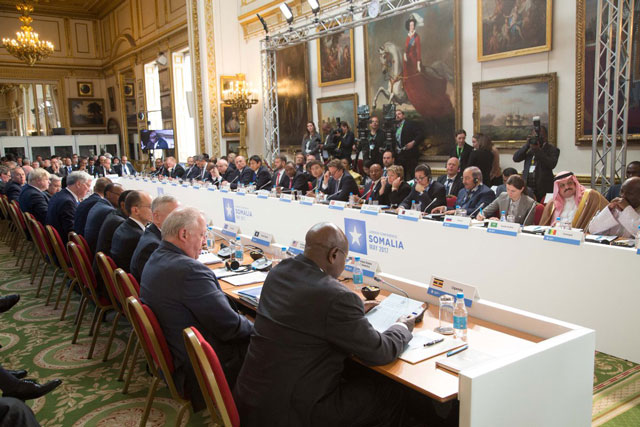
President Yoweri Museveni has said Somalia can heal completely and stand on its own feet if the country’s business class is supported, patriotic pan-Somalia political parties emerge and a truly national army is recruited and equipped.
Museveni outlined eight key achievements brought about by the intervention of the African Union Mission to Somalia (AMISOM) troops. He said the AMISOM effort has led to the revival of Somalia, but pointed out economic, political and military bottlenecks stand in the way to full recovery of the country.
Key to the achievements, he said, is that the Somali Government moved from exile in Kenya where it had been based, to Mogadishu, and indirect elections have been held regularly since. He also mentioned that the menace of piracy at sea has been tamed.
“Our strongly held view is that it is not enough to check Al-Shabaab. Somalia must heal completely and stand on its own feet. In our view, there are a number of bottlenecks that stop the complete healing of Somalia,” Museveni told the International conference on Somalia in London on Thursday.
At the meeting, attended by key African leaders, US defence secretary Jim Mattis (click for speech) and UK Prime Minister Theresa May, Somalia struck a new stability pact with the international community that is aimed at steadying the fragile state by bolstering its security, staving off famine and rebooting its economy.
New President Mohamed Abdullahi Mohamed hailed a “historic day for Somalia” after concluding the pact between Mogadishu and the international network propping up the crisis-wracked country.
Museveni was proud that Uganda Peoples Defence Forces (UPDF) had led the AMISOM mission to save Somalia. (READ FULL SPEECH ON PAGE 2)
“Uganda was the pioneer troop contributing country with the leading elements of our first contingent landing in Mogadishu on the 6th of March, 2007,” he said.
“Many observers were convinced that our effort was hopeless, if not suicidal. We were, however, confident of the correctness and feasibility of our decision. This was due to our knowledge of the African peoples, those people that have inhabited this area for the last four million years.”

Military strategy
Museveni outlined the economic, political and military steps needed for the full recovery of Somalia, but put emphasis on security. (Watch video here)
The AMISOM force from Uganda, Kenya, Ethiopia, Burundi and Djibouti plans to start withdrawing from Somalia in 2018.
He urged the international community agree to pay a large Somali Army for some years so that the wholly liberated Somali territory can be used to generate revenues to pay the public servants and also cope with other obligations.
“Patriotic ideas must be infused in the Somali National Army recruited on a quota basis from all parts of the country. This Army needs officers, NCOs, specialists in addition to ordinary soldiers,” he said.
He warned that the multiplicity of trainers (from different countries) of the Somali Army needs to be coordinated by the Somali Command around a Somali forces military doctrine so that it becomes a cohesive force with a clear historical mission.
“The Somalis need to resolve the issue of whether they will re-build the Somali Army by pay or patriotism. If it is by pay, who will pay them? Is the Somali State able to pay a large Army on that big territory of 637,657sqkms it needs so as to pacify the whole country? The present partial pacification of the country is not good enough.”
 The Independent Uganda: You get the Truth we Pay the Price
The Independent Uganda: You get the Truth we Pay the Price



